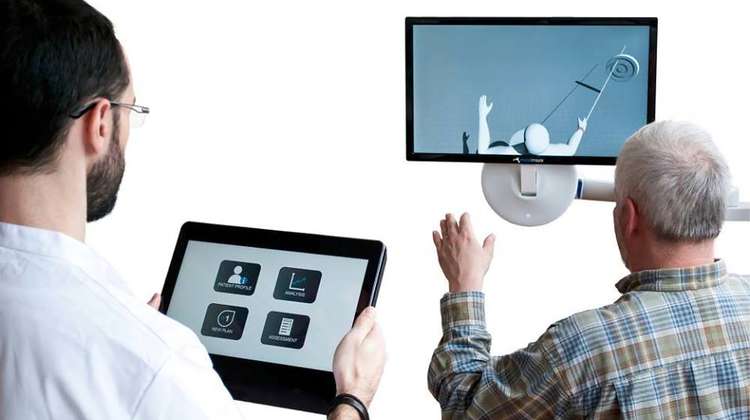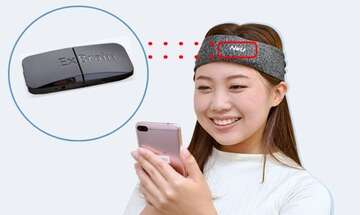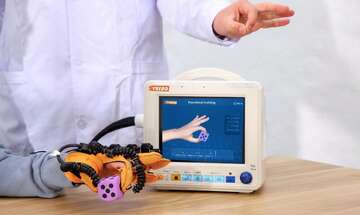Virtual Reality Games Help Stroke Patients with Upper Limb Recovery
 images: MINDMAZE.CH
images: MINDMAZE.CH MindPlayPRO, a portable virtual reality device created by MindMaze, was tested at the University Hospital of Lausanne (CHUV) in Switzerland for the purpose of evaluating its effectiveness in stroke rehabilitation programs.
The MindPlayPRO, an advanced interactive virtual reality platform designed by MindMaze for upper limb motor rehabilitation, has been tested at the University Hospital of Lausanne (CHUV) for two years, with very positive results.
The MindPlayPRO is the first interactive device for upper limb motor rehabilitation designed for use in hospitals and rehabilitation clinics. The device delivers virtual reality based exercises to motivate patients and maximize their training through a series of interactive sessions that match their needs and physical abilities. The MindPlayPRO provides accurate diagnostics and tracks the patients’ performance, offering physical therapists and physicians objective data on brain, movement, and muscle patterns, which helps these professionals create more effective exercise plans for the patients’ recovery.
MindMaze is a Swiss research and development company dedicated to improving the quality of life of individuals suffering from brain and spinal cord injuries. The MindMaze team consists of scientists from different fields, including cognitive neuroscience, microelectronics, virtual reality, regulatory systems for medical devices, and robotics. They use interactive 3D environments, gaming technologies, robotics and brain imaging to develop devices that assist with neurological rehabilitation.
MindPlayPRO, launched in September 2013, was the company’s first product. The device uses a camera with two stereo and depth sensors to accurately track and capture movement. Patients are presented with an interactive game on a 3D screen and can see their movements mapped on to an avatar. The interactive games available with the MindPlayPRo are designed to target specific motor skills.



The exercises require the patients to use their functioning arm to reach for a virtual object, but what they actually see on the screen is their other arm move. The game essentially tricks their brain into believing that their other arm is capable of moving and, as a result of the mirroring technique, new neural connections are stimulated. The device makes it possible to track the correlations between physiological and motor performance measurements, providing medical professionals with access to accurate data and the ability to analyse it and use the information to guide stroke patients’ progress.
Tej Tadi, neuroscientist and MindMaze founder and CEO, explained how the MindPlayPRO assists in recovery, "Say you cannot move your left hand, but you can move your healthy side and watch the virtual limb mimic your movements, hereby tricking the brain into believing that the virtual limb is your own and that then leads into some form of reorganisation or activation between different cortical areas, which we tap into, we measure, and then customise and exercise to maximise that plasticity."
The MindPlayPRO can be used with medical devices like EEG, ECG and EMG, and it provides comprehensive analysis of trajectory, velocity and range of motion. The system uses 3D motion capture technology to evaluate patients’ movements.
To see how the MindPlayPRO is used in rehabilitation, watch the video on Reuters TV.
Source: Reuters

 SEND INQUIRY
SEND INQUIRY









